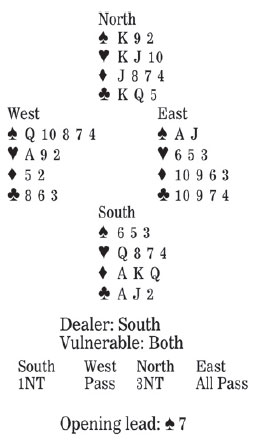A standard rule in another setting
Updated: 2017-02-25 07:12:01Charles M. Schwab said, "All successful employers are stalking men who will do the unusual, men who think, men who attract attention by performing more than is expected of them."
Successful bridge players stalk tricks, which occasionally requires doing the unusual - as in today's deal. South is in three no-trump. West leads a fourth-highest spade seven. What should happen after that?
This is the single most common bidding sequence. South assumes that North will cover the spade suit, and North assumes that South will coast home easily with a combined 28-30 points between them.
South starts with seven top tricks: four diamonds and three clubs. He can easily establish three more winners in hearts. His only concern is the spade suit. Well, there is no hurry to put up dummy's king. That can wait until the second round of the suit.
Now the spotlight falls on East. He knows that when the lead is fourth-highest, he should apply the Rule of Eleven. Seven from 11 is four. So there are four spades higher than the seven in the North, East and South hands combined. Lo and behold, East can see all four: the king-nine on the board and the ace-jack in his hand. So South has no spade higher than the seven. This would tempt some Easts to win the first trick with the jack - irreparably blocking the suit. A stalker will win with the ace and return the jack, trusting his partner to overtake with the queen to drive out dummy's king. Then, when West gets in with his heart ace, he cashes the rest of the spades for down one.
Agencies

|
|
|
|
|
|
|
|

























 Raymond Zhou:
Raymond Zhou: Pauline D Loh:
Pauline D Loh: Hot Pot
Hot Pot Eco China
Eco China China Dream
China Dream China Face
China Face






